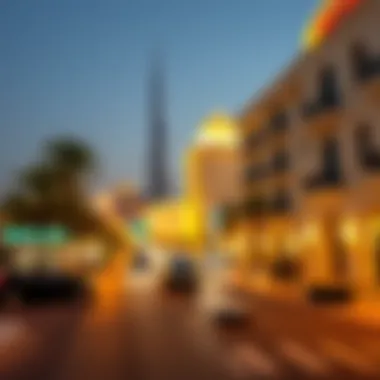Life in Dubai for Foreigners: Insights and Experiences


Intro
Moving to Dubai is like stepping into a complex puzzle, but one that brings together a vibrant mix of cultures and backgrounds. For many expatriates, it represents more than just relocation; it’s about adventure and new possibilities. Since its transformation into a global hub, Dubai has attracted individuals from different corners of the world, each bringing their stories and experiences.
This cosmopolitan city offers a kaleidoscope of opportunities, ranging from professional advancement to personal growth. With its bustling economy, foreigners are often amazed by the job prospects available across various sectors. However, navigating through the job market and societal norms can be a daunting task.
Cultural diversity plays a significant role in shaping the social fabric of the city. From lavish shopping malls to traditional souks, the lifestyle here is a blend of the modern and the historical. This article aims to deliver a compelling narrative, peeling back the layers of expatriate life in Dubai. We will explore:
- The rich tapestry of different cultures and how they coexist
- Employment opportunities and their implications
- Housing considerations that meet different budgets and lifestyles
- Leisure activities and how they enhance the living experience
In the following sections, we will dive deeper into these aspects, offering insights and practical advice for those considering making Dubai their home.
Overview of Expat Life in Dubai
Understanding life as an expatriate in Dubai is crucial for anyone considering moving to this vibrant city. This section provides a foundational overview of the expat experience, illustrating why Dubai stands out as a prime destination for foreigners. The dynamics of living in Dubai not only involve the promise of an efficient lifestyle but also the unique cultural mix that colors everyday life.
For many, arriving in Dubai feels like jumping into the deep end. With over 80% of its population being expatriates, * newcomers will quickly realize that the community is a melting pot of cultures*. This rich tapestry enhances social interactions and can often make settling in more accessible. A significant draws to life in Dubai includes the tax-free income, which allows many expatriates to boost their savings considerably. Additionally, the city's modern infrastructure supports a fast-paced lifestyle that appeals to young professionals and families alike.
However, expat life is not without its challenges. Assimilating into a new culture brings its share of obstacles, from understanding local customs to navigating legal requirements. Moreover, the sometimes transient nature of the expatriate community can lead to feelings of isolation, making social integration a challenge for some.
Despite these potential hurdles, the expat experience in Dubai is overwhelmingly positive for many. By setting clear expectations and embracing the diverse cultural landscape, newcomers can find both personal and professional satisfaction. In this narrative, we will explore the intricacies of living in Dubai, addressing both the bright spots and the harder truths of expatriate life.
Understanding Dubai's Expatriate Demographic
Dubai's expatriate demographic is a remarkable aspect that contributes to the city’s global character. People from various backgrounds call Dubai home, attracted by its job opportunities, lifestyle, and cosmopolitan charm. Countries such as India, Pakistan, the Philippines, and the United Kingdom represent significant portions of the population. In many ways, this diversity shapes the city’s social fabric, influencing everything from dining options to cultural events.
The multicultural environment in Dubai means that many expatriates have similar stories to share. They typically arrive with aspirations for better career prospects, and their collective experiences create a unique support system. Understanding these communal ties helps newcomers to feel more connected, offering an immediate network of contacts that might mitigate the initial isolation of relocating.
Historical Context of Foreign Populations
Examining the historical context of foreign populations in Dubai gives insight into how the city has evolved into the international hub it is today. Initially, Dubai was a modest trading post, flourishing primarily due to its strategic location along trade routes. Over time, the discovery of oil transformed the emirate, attracting a wave of workers from around the world.
Between the 1970s and 1990s, the influx of expatriates skyrocketed, as labor was needed to build the infrastructure that supports today’s modern city. This growth resulted in the establishment of vibrant expatriate communities that laid the groundwork for the multicultural society found today. Importantly, the government has implemented policies that encourage this diversity, aiming to maintain a balance between local culture and foreign influence.
Understanding this backdrop allows current and prospective expatriates to appreciate not only their presence but also the contribution of their predecessors to Dubai's current landscape. By recognizing the journey and challenges faced by earlier foreign populations, today’s newcomers may navigate their journey with greater awareness and receptiveness.
Economic Landscape for Foreigners
The economic landscape in Dubai plays a significant role in shaping the experiences of expatriates. With its vibrant and diverse market, Dubai has burgeoned into a global trade nexus, offering a smorgasbord of job opportunities, cultural exchanges, and entrepreneurial ventures. Understanding how this economic environment operates is key for newcomers aiming to establish their lives in the city. Whether you’re an investor, a potential homebuyer, or simply looking for work, grasping the ins and outs of Dubai's economy can significantly enhance your transition.
Job Opportunities and Key Sectors
Dubai's economy is built on a solid foundation that encourages growth across various sectors. Notably, industries like tourism, real estate, healthcare, and technology present ample job opportunities for expatriates. For instance, the tourism sector alone employs thousands, with high demand for skilled professionals in hospitality, event management, and travel services. Also, the construction industry is booming, particularly with large-scale projects leading up to events like Expo 2020.
Among the key sectors, the tech industry is also making waves. Startups are sprouting up all over the city, in part due to the government’s push to create a tech-friendly environment. Consequently, positions in IT, digital marketing, and cybersecurity are on the rise.
For many expats, the ability to find rewarding jobs will directly impact their quality of life. Therefore, it’s vital to keep an ear on the ground and get acquainted with industry trends that might point you toward promising job prospects.
Understanding Salary Expectations
Once you've identified potential job opportunities, the next step is understanding salary expectations. Salaries in Dubai can vary widely depending on the sector, job role, and company. Generally, skilled professionals enjoy favorable salaries coupled with tax-free income. However, it’s essential to consider the cost of living when negotiating your pay.
In sectors like finance or healthcare, salaries can be quite lucrative. For example, a senior project manager in the construction sector may earn anywhere from 30,000 to 50,000 AED a month. Conversely, entry-level positions in retail may offer less, often falling between 8,000 to 12,000 AED monthly.
Understanding what you should expect can help you avoid pitfalls during salary negotiations. It's best to do your homework, consult industry reports, and even gather insights from forums or groups on platforms like reddit.com to have a more accurate picture.
Self-Employment and Entrepreneurship in Dubai
Dubai is increasingly becoming a haven for entrepreneurs looking to set up their own businesses. The government's emphasis on innovation and economic diversification has resulted in a dynamic atmosphere for self-employment. For those who possess an entrepreneurial spirit, opportunities abound in various sectors such as technology, e-commerce, and consultancy.
Setting up a business in Dubai is relatively straightforward, thanks to streamlined procedures and numerous free zones catering to foreign ownership. Each free zone allows 100% ownership along with various incentives like no personal income taxes. However, it’s crucial to note that different jurisdictions come with their own rules and regulations. Prospective entrepreneurs should consult the relevant resources or local business setup services to navigate these waters.
In summary, the economic landscape in Dubai is loaded with opportunities. Understanding the job sectors, negotiating salary expectations, or even exploring self-employment can significantly influence an expat's experience in the city. By tapping into the right resources, newcomers can not just adapt, but thrive in this bustling environment.
Housing and Accommodation
Understanding housing and accommodation is crucial for anyone looking to settle in Dubai, especially for foreigners. As a city that combines tradition with modernity, the living arrangements reflect the diverse culture and lifestyles of its inhabitants. This section will shed light on the types of housing available, the cost of living related to accommodation, and the popular neighborhoods frequented by expatriates.
Types of Housing Available for Expatriates
Luxury Properties
Luxury properties in Dubai symbolize opulence and upscale living. High-rise apartments and villas in exclusive communities offer stunning views and top-notch amenities. The key characteristic of these properties often includes features like private pools, spa facilities, and concierge services. They attract foreigners looking for a lavish lifestyle and comfort right at their doorstep.
One unique feature of luxury properties is their location, often situated in prime areas such as Palm Jumeirah or Downtown Dubai. This accessibility to major attractions can be a double-edged sword; while it brings convenience, the rental prices can be sky-high, potentially making it a strain on the wallet for those on a budget.


Shared Accommodation
Shared accommodation is quite popular among young expatriates and those who are newly arrived in the city. Many opt for this arrangement to save costs and foster a sense of community. Shared flats or houses provide an affordable alternative to renting a whole property. The key benefit here is the reduced living expenses, which allows residents to channel their resources into exploring other facets of Dubai.
A unique aspect of shared accommodation is the social dynamic it fosters. Living with others can help newcomers integrate more quickly and share insights about the local area. However, it’s not all sunshine—finding the right roommates who align with one's lifestyle preferences can sometimes be tricky.
Long-Term Rentals
Long-term rentals offer a stable housing solution for expatriates looking to establish roots in Dubai. Unlike short-term leases, which can ramp up costs, long-term rentals typically come with more favorable rates. This accommodates families and individuals seeking consistency in their living situations.
The unique feature of long-term rentals is the flexibility they provide for expatriates who may be unsure about their long-term plans. They often come unfurnished, allowing residents to personalize their spaces. However, the downside could be potential issues with landlords regarding maintenance and communication.
Cost of Living and Rent Analysis
Gaining an understanding of the cost of living and rent in Dubai is vital for planning one’s finances. Although Dubai is often seen as a luxurious destination, it’s essential to balance the allure of its lifestyle against the high rental prices. Rent can range widely based on the area, type of property, and market demand. For instance, a one-bedroom apartment in a central area might set residents back by a sizable chunk of salary while a similar property in a more suburban location may offer better value.
It is wise for potential residents to assess their budget before moving. Many expatriates recommend budgeting an amount that allows for not just rent, but utilities, groceries, and leisure activities too.
Popular Neighborhoods for Expats
Dubai Marina
Dubai Marina stands out as one of the most sought-after locations for expatriates, famed for its glitzy skyline and stunning waterfront. This neighborhood offers a vibrant lifestyle with numerous dining, shopping, and leisure options. A key characteristic of Dubai Marina is the lifestyle it promotes—living close to water and enjoying activities like sailing or beach outings most days of the year.
One unique feature is the Walk, a mile-long promenade lined with restaurants, cafes, and shops. While the area is ideal for socializing, it can be expensive, especially for families looking for larger residential spaces.
Jumeirah Lake Towers
Jumeirah Lake Towers (JLT) is another neighborhood that attracts expats due to its cost-effectiveness compared to its neighboring areas. The characteristic of JLT includes a combination of residential and commercial spaces, leading to a somewhat eclectic environment.
The community vibe here is palpable, thanks to the various recreational facilities around the lakes. While JLT offers more budget-friendly housing, the trade-off can be the sometimes noisy nightlife, which might not suit everyone’s preference.
Downtown Dubai
Downtown Dubai epitomizes the city's hustle and bustle, with landmarks like the Burj Khalifa and Dubai Mall nearby. This area is popular for those who want to be at the heart of it all. One characteristic that sets Downtown apart is its blend of high-end apartments and vibrant community life.
However, the unique feature here is the cultural experiences that come with living close to art galleries and performance venues. On the flip side, it is essential to keep in mind that rent in Downtown can be on the higher side, positioning it more as a luxury lifestyle choice.
Engaging with the housing scene in Dubai is not just about finding a roof over your head; it’s about discovering a lifestyle that suits your needs and preferences.
Cultural Experience and Social Integration
When considering life as a foreigner in Dubai, the aspects of cultural experience and social integration are pivotal. The cosmopolitan landscape of Dubai, with its melting pot of cultures, offers unique opportunities to connect with people from various backgrounds. Foreigners often appreciate the chance to immerse themselves in a distinct cultural milieu, which can lead to enriching experiences and life-long friendships. However, recognizing potential challenges is equally critical for successful integration, making the balance of understanding, participation, and adaptation essential.
Cultural Diversity and Interactions
Dubai stands as a beacon of cultural diversity, functioning as a hub that attracts individuals from all over the globe. Nationals from countries like India, Pakistan, the Philippines, and many Western nations create a vibrant tableau. Interactions between these varied cultures happen daily in workplaces, parks, and social events. Notably, events such as the Dubai Shopping Festival and Global Village showcase this dynamic diversity.
One of the charming elements of living in Dubai is the food scene, which mirrors this cultural exchange. From street vendors offering authentic Middle Eastern shawarma to upscale dining experiences that highlight tastes from India to Japan, culinary exploration becomes a daily adventure. This blend of cultures fosters conversations that deepen mutual understanding and respect, breaking down barriers and nurturing friendships.
Key Points:
- The multicultural environment enhances personal experiences.
- Culinary diversity invites both adventure and comfort.
- Events promote interaction, fostering a sense of community among expatriates.
Social Clubs and Community Engagement
Finding a sense of belonging is paramount for expatriates in Dubai. Numerous social clubs and organizations cater to various interests, ranging from sports teams to cultural associations. For instance, the Dubai Expat Club provides a platform for newcomers to connect with others who share their interests, while groups like the American Club offer an avenue for networking.
Engagement in community service, be it through organizing charity events or participating in cleanup drives along the beaches, also creates a strong sense of purpose. Such activities not only strengthen the bonds within expatriate circles but also enrich one’s understanding of local customs and societal values.
Highlights of community engagement:
- Networking opportunities within various clubs.
- Participation in social causes strengthens community ties.
- Opportunities for skill-sharing and cultural exchanges.
Challenges in Cultural Adaptation
While Dubai offers an inviting environment, the journey of cultural adaptation is not without its hurdles. The rapid pace of life and the transient nature of expatriate populations can often put pressure on newcomers. Many find themselves grappling with feelings of isolation, especially given the city's vastness and the sometimes overwhelming nature of its fast-moving lifestyle.
Language barriers can also contribute to these challenges. Although English is widely spoken, nuances in dialects and informal communication styles may lead to misunderstandings. Additionally, every culture has its social norms and practices; foreign residents must navigate these sensitively to foster meaningful connections.
Common challenges faced by expatriates include:
- Feelings of isolation in a bustling city.
- Language barriers can complicate social interactions.
- Navigating a complex array of cultural norms and practices.
Summary
In essence, cultural experience and social integration are foundational elements of life in Dubai for foreigners. While the benefits of cultural diversity open doors to new friendships and experiences, it’s equally important for newcomers to acknowledge the challenges involved in adapting to this vibrant yet complex society. Ultimately, the essence of living in Dubai lies in both celebrating its rich tapestry of cultures and actively engaging with the local community, making the journey undeniably rewarding.


Recreation and Lifestyle Choices
Recreation and lifestyle choices play a vital role in the overall experience of expatriates living in Dubai. With the city’s astounding blend of cultural diversity, luxurious amenities, and vibrant social scene, foreigners find a myriad of options to unwind and engage with the community. Understanding these choices can significantly enhance the expatriate experience, providing opportunities for social integration and personal enjoyment.
Leisure Activities and Entertainment Options
Shopping Malls
Shopping malls in Dubai are not just retail spaces; they are lively destinations that showcase the best of what the city has to offer. Think of places like The Dubai Mall or Mall of the Emirates. These malls provide a unique blend of shopping, entertainment, and dining under one roof. With an astonishing variety of international brands and local boutiques, it caters to the tastes of every resident. The key characteristic of these malls is their size and variety, making them a preferred choice for both leisure and shopping.
"In Dubai, the mall isn't just a shopping spot; it’s part of the lifestyle."
One of the unique features of the malls is their range of leisure activities. From ice skating to virtual reality experiences, they attract families and individuals alike. However, a potential disadvantage is the overwhelming crowd, especially on weekends.
Beaches and Parks
The beaches and parks of Dubai offer an oasis for expatriates seeking leisure and relaxation. Jumeirah Beach and Al Barsha Pond Park are prime examples. These spaces provide not just scenic views but also opportunities for physical activities and gatherings with friends and family. The vibrant atmosphere of these locations makes them a popular choice for those looking to escape the bustling city life.
The unique aspect of these areas is the accessibility; it’s easy to find a spot to unwind or indulge in a picnic. However, during peak times, they can become quite busy, limiting the feeling of tranquility that many seek in these community spaces.
Dining Experiences
Dining in Dubai is an adventure in itself. The city boasts a culinary landscape that includes everything from street food carts to Michelin-starred restaurants. Dining experiences can range from the traditional meals at Ravi Restaurant to luxurious settings like Pierchic. What sets Dubai's dining scene apart is its cultural diversity, offering cuisines from every corner of the globe.
The unique feature here lies in the variety. Each meal can be a journey through different cultures, which is particularly appealing to expatriates eager to explore new flavors. One downside, though, might be the cost of more upscale dining spots, which can sometimes make eating out a splurge rather than an everyday occurrence.
Sports and Fitness Culture
The sports and fitness culture in Dubai is thriving, attracting residents who prioritize health and well-being. The presence of numerous gyms, yoga studios, and outdoor fitness classes reflects a community eager to embrace a healthy lifestyle.
Moreover, with events like the Dubai Fitness Challenge, individuals are encouraged to be active. This kind of culture fosters a sense of community, where people come together for not only fitness goals but for shared social experiences.
Events and Festivals Celebrated in Dubai
Dubai's calendar is filled with events and festivals that bring the community together. Whether it's the Dubai Shopping Festival or the UAE National Day celebrations, these occasions are infused with local customs and international vibes. The events create a lively atmosphere, fostering connections among residents from different backgrounds.
Participating in these festivities allows expatriates to immerse themselves in the local culture. It also serves as a reminder that Dubai, while a hub of modernity, is deeply rooted in its traditions. However, planning ahead is crucial, as some events can get overwhelming with the crowds.
Education and Childcare
As families consider relocating to Dubai, education and childcare become central to their decision-making process. The emirate’s diverse lifestyle includes a multitude of schooling options, each catering to different cultural backgrounds and educational philosophies. Ensuring quality education and childcare services not only assists expatriates in settling down smoothly but also directly impacts their family's overall quality of life. By understanding the landscape of education and childcare in Dubai, foreign residents can make informed decisions that align with their values and aspirations for their children.
Schooling Options for Expat Children
In Dubai, expatriate children have the luxury of selecting from various international schools. These institutions frequently follow curriculums that cater to different nationalities, including British, American, Indian, and more. This educational diversity is significant for families wanting to maintain their cultural ties or ease the transition for their children.
Popular schooling options include:
- British Schools: Typically follow the UK national curriculum, some famous names include Jumeirah English Speaking School and the British International School.
- American Schools: These offer the American curriculum and are known for their robust extracurricular activities; you can find schools like Dubai American Academy instilling values from early education.
- Indian Schools: Catering to the large Indian community, schools like the Indian High School provide CBSE and ICSE curriculums.
Additionally, many schools uphold high standards of education, with modern facilities and a focus on holistic development. However, parents often face competition for spots in these desirable institutions, necessitating early applications. Tuition fees can also be steep, so budgeting realistically is essential for families making the move to Dubai.
Higher Education Institutions in Dubai
For expatriates looking into higher education, Dubai boasts several respected universities and colleges that merge academic rigor with global recognition. Institutions such as the American University in Dubai and the University of Wollongong in Dubai provide an array of degrees in various disciplines.
Moreover, many universities in Dubai have established partnerships with foreign universities, making it easier for students to gain international experience or pursue dual degrees. This opens avenues for students looking to step into the global job market while still benefiting from the local context.
- Field-specific Programs: Dubai is home to specialized institutions like Middlesex University Dubai, known for its business programs, and Dubai Medical College, which offers courses in various medical fields.
- Research Opportunities: With a growing emphasis on research and innovation, many universities are investing heavily in research facilities, which enhances the educational experience and prepares students for future employment.
Availability of Childcare Services
For the younger crowd, access to quality childcare services is indispensable for expatriate families navigating work and home life in Dubai. The city features a variety of childcare options, from nurseries to preschools, many of which cater to specific demographics or educational philosophies.
Key factors include:
- Flexible Hours: Many nurseries offer flexible drop-off and pick-up times, which can accommodate varying work schedules.
- Multilingual Staff: To ease the fears of non-Arabic speaking parents, many facilities emphasize hiring multilingual staff. This approach not only makes children feel more at home but also fosters a more inclusive environment.
- Health and Safety Standards: Childcare services in Dubai typically adhere to strict health and safety standards, ensuring a secure learning environment for children. However, families are advised to visit facilities before settling on one to ensure it meets their expectations.
“Choosing the right educational and childcare setting can make a world of difference in your family’s transition into life in Dubai.”
Legal Framework and Residency
Life in Dubai for foreigners hinges substantially on understanding the legal framework and residency conditions. For expatriates, grasping the nuances of visas, rights, and obligations is as crucial as knowing the routes to work or leisure spots around the city. This section aims to demystify these important aspects, ensuring foreign residents feel informed and oriented as they navigate their new life.
Visa Options for Foreigners


Securing a visa is usually the first hurdle for anyone looking to plant their roots in Dubai. The UAE government offers a variety of visa options tailored for different needs:
- Employment Visa: Most expatriates enter Dubai through an employment visa sponsored by their employer. This visa is often tied to a contract and brings along work privileges.
- Investor Visa: Those looking to start a business or invest in local enterprises can apply for this visa, which usually comes with a longer term compared to a typical work visa.
- Family Visa: Allows expatriates with residency to sponsor family members. This is especially relevant for those who want their families to join them in this bustling city.
- Student Visa: For those pursuing higher education, a student visa allows individuals to study at approved institutions while living in Dubai.
- Retirement Visa: Newer initiatives cater to retirees wishing to spend their golden years in the city, providing more options for global citizens making Dubai their second home.
Each visa type has specific documentation requirements and conditions that must be met. It’s advisable to stay updated with the latest immigration regulations, as the policies can change frequently.
Rights and Responsibilities of Residents
Understanding your rights as a resident in Dubai is vital. Expatriates are entitled to various rights, including:
- Legal Protections: Residents have the right to legal aid and representation. The legal system may present challenges, but there are resources to help navigate legal matters.
- Privacy Rights: Expats are entitled to privacy in their homes and personal dealings. This is protected by law, providing reassurance amid potential cultural misunderstandings.
- Non-Discrimination: UAE law supports equality, prohibiting discrimination based on nationality, race, or religion, which is encouraging for a diverse community.
However, there are also responsibilities that come with these rights:
- Adherence to Local Laws: Residents must respect local laws, many of which can differ significantly from those in their home countries. Ignorance of the law is not considered a valid defense in Dubai.
- Visa Renewal and Compliance: Ensuring that one’s visa is renewed on time and that the terms of stay are followed is paramount to avoid legal troubles.
- Cultural Sensitivity: Engaging with local customs and traditions is not only respectful but often encouraged in neighborhoods and workplaces, making integration smoother.
Navigating Legal Issues in Dubai
Despite the structured environment, expats may encounter legal hiccups. These bumps in the road might include:
- Contractual Disagreements: Issues with employment contracts or rental agreements can arise. Knowing where to seek help, whether from legal aid services or community forums like reddit.com, can be beneficial.
- Visa Complications: Delays or errors in visa processing can lead to overstays or unintentional breaches of law. It's advisable to keep documentation organized and seek professional help if issues occur.
- Disputes with Employers or Landlords: Should a dispute arise, knowing the correct channels to resolve these issues, such as the Ministry of Human Resources and Emiratisation, is crucial.
Generally, it’s wise to stay informed about changes in UAE law and procedures, as they may impact residency status or living conditions.
Important: Always consult with a legal expert or trusted advisor if a complex issue arises. Reliable resources such as *.gov websites can provide up-to-date and authoritative guidance.
Health and Well-being
Health and well-being are fundamental aspects of life that merit special mention when discussing life in Dubai, particularly for expatriates. When individuals move to a new country, especially one as diverse and dynamic as Dubai, maintaining a good quality of health impacts not just personal stability but also social integration and professional performance. Understanding healthcare facilities, insurance requirements, and mental well-being resources helps newcomers navigate challenges effectively.
Healthcare System Overview
Dubai boasts an advanced healthcare system recognized for its quality of services. The UAE Government has heavily invested in healthcare infrastructure, ensuring that both nationals and expatriates have access to top-notch medical facilities.
In Dubai, healthcare is provided by both public and private sectors. Public hospitals, such as Dubai Health Authority facilities, tend to offer lower costs, although expatriates might find longer wait times and less personalized care. On the other hand, private hospitals like Mediclinic and American Hospital provide faster services and typically focus on patient comfort and experience, though their fees can be substantial.
The availability of specialized doctors and treatment options is impressive, with many medical professionals trained in leading hospitals globally. Additionally, expatriates often choose to seek services that on higher-end care, like cosmetic surgeries or advanced diagnostics, which are prevalent in the city.
Health Insurance Requirements
Before coloring your expat journey in Dubai, be aware that health insurance is not just a good idea—it's a necessity. All residents, including expatriates, are required to have health insurance coverage. Employers typically provide basic insurance plans, but these might not suffice, especially for family coverage or specific treatments. Expats often find themselves scouting for plans that offer comprehensive coverage tailored to their needs.
When looking for health insurance, consider these factors:
- Network of hospitals: Ensure your insurance covers a broad range of hospitals and clinics.
- Pre-existing conditions: Confirm whether your plan covers any pre-existing conditions.
- Limitations and exclusions: Understand what treatments may not be covered.
While employers often handle some details, proactively reviewing your health insurance ensures you aren’t caught off guard when you need care.
Mental Well-being Resources
The fast-paced lifestyle in Dubai, along with cultural transition and adjustment challenges, can provoke stress for many expatriates. Acknowledging and addressing mental well-being is crucial for leading a balanced life.
Dubai has made strides in promoting mental health awareness. Numerous organizations, such as the Dubai Community Development Authority and various private mental health professionals, offer resources for those seeking support. Expats can find counseling services and support groups that cater specifically to the challenges faced by foreigners. Online platforms and forums can also provide community support and helpful information.
Indeed, it's important to treat mental health with the same urgency as physical well-being. Engagements in activities like yoga or meditation, often found in various centers or communities, can help relieve stressors.
"Taking care of your mental health is not a luxury; it's a necessity."
Community Contributions and Volunteering
Living in Dubai as a foreigner offers unique opportunities to become involved in the local community, and engaging in volunteering can be one of the most rewarding experiences. This not only fosters personal growth but also contributes positively to the vibrant society in which expats find themselves. This section discusses the significance of consulting and participating in local initiatives, providing a deeper understanding of the benefits waiting for those who take the plunge.
Engagement in Local Initiatives
When expats engage in local initiatives, they open the door to a multitude of experiences that enrich their lives. By participating in community projects, cultural events, or even charity drives, they establish connections and roots in the region. For example, volunteering with organizations such as Dubai Volunteering or participating in city clean-up drives helps build a sense of belonging.
Some noteworthy local initiatives include:
- Food Bank Projects: Many expats join food donation drives that cater to those in need.
- Animal Welfare Organizations: Joining groups focused on rescuing and finding homes for stray animals presents a fulfilling outlet for animal lovers.
- Cultural Festivals: Many expats contribute their various skills and talents to festivals showcasing the diverse cultures represented in Dubai, facilitating a mutual exchange of ideas and values.
Engaging in such activities does not just benefit the community economically and socially; it immerses newcomers in the culture, helping to break down barriers and build friendships that can last a lifetime.
Benefits of Volunteering for Expats
Volunteering in Dubai goes beyond altruism—there are tangible benefits for expatriates as well. Here’s a closer look at some of these advantages:
- Networking Opportunities: Volunteering allows expats to meet locals and fellow expatriates, broadening their professional and personal networks in ways that can lead to new job opportunities, friendships, and collaborations.
- Skill Development: Many organizations look for specific skills, offering expats an opportunity to polish existing ones or gain new skills that can be valuable in their professional lives. This is especially useful for those looking to transition into new fields.
- Cultural Understanding: Actively participating in the community enables foreigners to grasp the local customs, traditions, and social dynamics, yielding a much deeper appreciation of life in Dubai.
- Personal Satisfaction: Helping others brings a profound sense of fulfillment. The act of giving back can enhance mental well-being and provide a unique sense of purpose.
- Family Engagement: Many expats involve their families in volunteering. Such shared experiences can strengthen bonds and create memorable family moments.
Engaging with the community throws open the doors to a multitude of benefits, making volunteering an integral part of a foreigner's life in Dubai. It’s a chance to not just live in a new place but truly feel like one belongs.
"The best way to find yourself is to lose yourself in the service of others." - Mahatma Gandhi
Understanding the nuances of community contributions is vital for creating a harmonious life in a city as diverse as Dubai. By blending individual aspirations with collective efforts, expats can successfully navigate this unique intersection of cultures.



